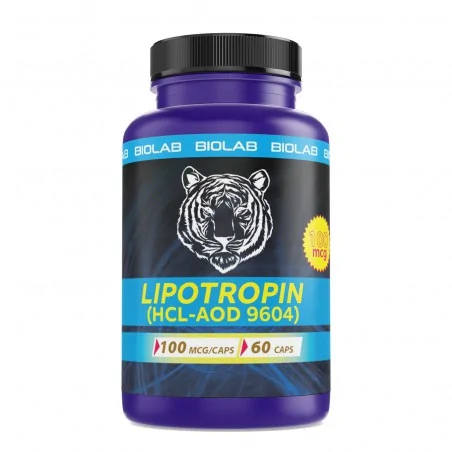
LIPOTROPIN 100mcg
Product code:
Buy 3 and get 3% discount
Buy 5 and get 5% discount


Product code:












LIPOTROPIN 100mcg
AOD9604 is a peptide fragment of the C-terminus or lipolytic domain of hGH (hGH 177-191), with an additional tyrosine residue at the N-terminus for stabilization. In vitro and in vivo experiments showed similar effects of AOD9604 and hGH on lipid metabolism when chronically applied in mice. Interestingly, AOD9604 mimics the effects of hGH on lipid metabolism, without growth-promoting or pro-diabetic effects.
Benefits of use:
AOD 9604 has many other growth hormone-related regenerative properties. It is being investigated for use in osteoarthritis, hypercholesterolaemia, bone and cartilage repair. It has an excellent safety profile and has recently been granted Human GRAS status in the US.
Human Obesity is no longer a health problem of only industrialized countries but is now recognized as present worldwide. It has a global impact on health and diseases associated with significant morbidity and mortality, particularly diabetes and cardiovascular disease. Human growth hormone (hGH) is not only important for growth processes in childhood but plays a key role in lipid metabolism throughout life. It is well known that hGH is involved in the regulation of lipolysis and lipogenesis. Therefore, hGH has been considered a good potential candidate for the treatment of obesity. However, undesirable side effects such as induction of glucose intolerance and insulin resistance, diabetes, acromegaly, cancer, edema, and hypertension have made therapeutic doses of hGH unsuitable for long-term treatment in humans.
Six human clinical trials of AOD9604 hexadecapeptide were conducted between 2001 and 2006, involving 893 clinically obese healthy adults in all but one study, and form the basis of this safety assessment. Details of each study are listed in the supplemental data. The first 3 studies were dose escalation studies examining the acute effects of different doses and two routes of administration (i.v. and oral) in healthy or obese men. These single-dose studies were followed by a 7-day multiple-dose study (METAOD004), and two long-term clinical trials (METAOD005 and METAOD006) investigating the safety and tolerability of chronic oral treatment with AOD9604. Serum IGF-1 levels remained relatively constant over the dosing period, with no apparent differences between treatment groups.
Fasting plasma glucose and serum insulin levels remained unchanged throughout the treatment period. Overall, treatment of obese patients for 24 weeks with daily doses of 0.25 mg to 1 mg of AOD9604 showed a good safety and tolerability profile that was indistinguishable from placebo. AOD9604 supplementation did not worsen glucose control or induce insulin resistance. In contrast, AOD9604 treatment appeared to have a positive effect in patients with impaired glucose tolerance. In a 12-week study, patients with impaired glucose tolerance supplemented with AOD9604 were less likely to develop diabetes during the study than those taking placebo. However, this hypothesis needs to be confirmed in a separate clinical trial. In contrast, in a recent clinical trial of the effects of hGH on obese women, hGH increased IGF-1 levels over a 6-month dosing period and reduced glucose tolerance in a subgroup of study participants.

Your review appreciation cannot be sent
Report comment
Report sent
Your report cannot be sent
Write your review
Review sent
Your review cannot be sent
Customers who bought this product also bought:
BYE ACNE
NIEPOKALANEK
Mk-677 Ibutamoren 60tab/10mg
MAGNESIUM CITRATE + VIT B6...
PT-141 SPRAY 10mg
S-23 30ml 600mg
CORTAGEN SPRAY 20mg
CJC-1295 + DAC 5mg
Newsletter
SIGN UP AND STAY UP TO DATE!
We specialize in wholesale and retail supply of high quality peptides.
Category
Our company
Add to wishlist
((title))
Sign in
You need to be logged in to save products in your wishlist.